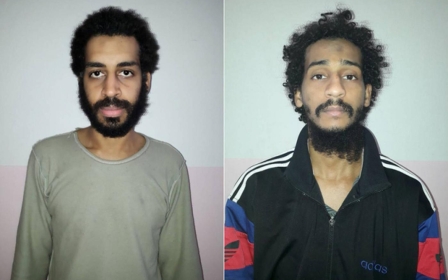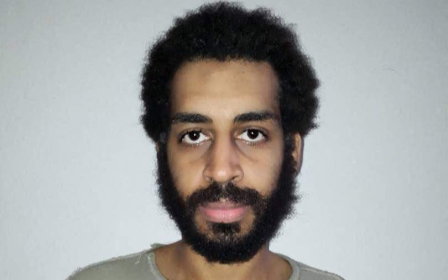Islamic State 'Beatles' member El Shafee Elsheikh convicted for role in deaths of Americans

A US jury has convicted a British national for his role in an Islamic State group (IS) hostage-taking scheme that took roughly two dozen westerners captive a decade ago, resulting in the deaths of four Americans, three of whom were beheaded.
The jury deliberated for four hours before finding El Shafee Elsheikh guilty on all counts. Elsheikh stood motionless and gave no visible reaction as the verdict was read. He now faces up to a life sentence in prison.
In convicting Elsheikh, the jury concluded that he was one of the notorious "Beatles", IS captors nicknamed for their accents and known for their cruelty – torturing and beating prisoners, forcing them to fight each other until they collapsed and even making them sing cruel song parodies.
Surviving hostages testified that the Beatles delighted themselves rewriting "Hotel California" as "Hotel Osama", and making them sing the refrain, "You will never leave."
The guilty finding on Thursday came even though none of the surviving hostages could identify Elsheikh as one of their captors.
Although the Beatles had distinctive accents, they always took great care to hide their faces behind masks and ordered hostages to avoid eye contact or risk a beating.
Prosecutors suggested in opening statements that Elsheikh was the Beatle nicknamed "Ringo", but only had to prove that Elshiekh was one of the Beatles because testimony showed that all three were major players in the scheme.
Elsheikh, who was captured by the Kurdish-led Syrian defence forces in 2018, eventually confessed his role in the scheme to interrogators as well as media interviewers, acknowledging that he helped collect email addresses and provided proof of life to the hostages’ families as part of ransom negotiations.
But testimony showed that he and the other Beatles were far more than paper pushers. The surviving hostages, all of whom were European – the American and British hostages were all killed – testified that they dreaded the Beatles’ appearance at the various prisons to which they were constantly shuttled and relocated.
'We could barely lift our arms'
Surviving witness Federico Motka recounted a time in the summer of 2013 when he and cellmate David Haines were put in a room with American hostage James Foley and British hostage John Cantlie and forced to fight each other.
"They were super excited about it," Motka, who suffered 14 months of brutality at the hands of his IS kidnappers, told the court two weeks ago.
The losers were told they’d be waterboarded. Weak from hunger, two of the four passed out during the hourlong battle.
"We were so weak and shattered we could barely lift our arms."
The convictions on all eight counts in the US district court in Alexandria revolved around the deaths of four American hostages: James Foley, Steven Sotloff, Peter Kassig, and Kayla Mueller.
All but Mueller were executed in videotaped beheadings circulated online. Mueller was reportedly raped multiple times by IS leader Abu Bakr al-Baghdadi before she was killed.
They were among 26 hostages taken captive between 2012 and 2015, when IS controlled large swaths of Iraq and Syria.
Defence lawyers acknowledged that Elsheikh joined IS but said prosecutors failed to prove he was a Beatle. They cited a lack of clarity about which Beatle was which, and back in the trial’s opening statement cited the confusion about whether there were three or four Beatles.
Prosecutors said there were three - Elsheikh and his friends Alexenda Kotey and Mohammed Emwazi, who all knew each other in England before joining IS.
Emwazi, who was known as "Jihadi John" and carried out the executions, was later killed in a drone strike.
Kotey and Elsheikh were captured together in 2018 and brought to Virginia in 2020 to face trial after the US promised not to seek the death penalty. Kotey pleaded guilty last year in a plea bargain that calls for a life sentence but leaves open the possibility that he could serve out his sentence in the United Kingdom after 15 years in the US.
Middle East Eye delivers independent and unrivalled coverage and analysis of the Middle East, North Africa and beyond. To learn more about republishing this content and the associated fees, please fill out this form. More about MEE can be found here.





